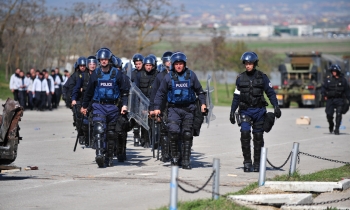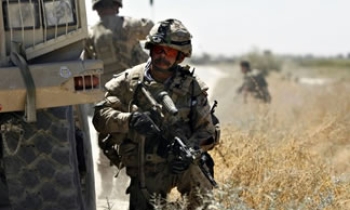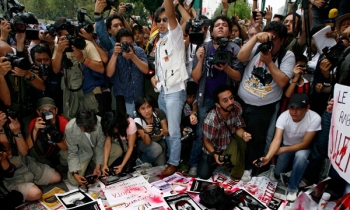The European Federation of Journalists (EFJ) has condemned amendments to the UK Counter Terrorism Act, which came into force in the UK on February 16. The amendments contain powers of arrest and imprisonment of anyone who takes pictures of police officers or other public servants which are "likely to be useful to a person committing or preparing an act of terrorism."
"This is a serious setback for press freedom which is going to have a devastating effect on the work of photojournalists," said Arne König, EFJ President. "We don't believe that there is a level of security considerations which can justify the kind of shield the new law affords to public figures by preventing journalists from taking pictures of "members of the armed forces, intelligence services and police officers. The next step would be that reporters would not be allowed to describe what they see."
According to media reports, hundreds of photojournalists took part in a demonstration on February 16 in front of Scotland Yard, the British Metropolitan Police Headquarters in central London, to protest against the new Act. The Metropolitan Police Federation has also expressed support to photojournalists, noting that "we do not want to be a secret police". The Federation described the law as "unfair" and "completely avoidable" and called for a mutually agreed code between the police and journalists.
"We congratulate our British colleagues for the fantastic turnout at the demonstration outside Scotland Yard in London," added König. "They showed that they will not accept to be treated like terrorists themselves. We also welcome the Metropolitan Police's willingness to work with photojournalists in finding the way forward."
EFJ and its national affiliate in the UK, the National Union of Journalists (NUJ) are concerned that the law will be used to stop photographers doing legitimate work."Unfortunately, photojournalists face increasing restrictions on photojournalism in public spaces and during public events throughout Europe," said König.
EFJ organised a photo journalists' meeting two months ago in which a set of conclusions were adopted, including coordinated action at the European level to fight for the right to take pictures in public spaces and to elaborate internal guidelines on how to behave with the police in times of conflict following provisions on police surveillance introduced in anti-terrorism legislation in Europe.










